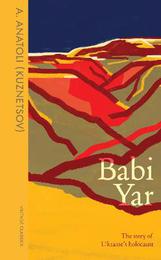
|
Babi Yar: The Story of Ukraine's Holocaust
Hardback
Main Details
| Title |
Babi Yar: The Story of Ukraine's Holocaust
|
| Authors and Contributors |
By (author) A. Anatoli
|
|
Translated by David Floyd
|
| Physical Properties |
| Format:Hardback | | Pages:528 | | Dimensions(mm): Height 222,Width 144 |
|
| Category/Genre | Classic fiction (pre c 1945)
The Holocaust
Second world war |
|---|
| ISBN/Barcode |
9781784878399
|
| Classifications | Dewey:940.5318445 |
|---|
| Audience | |
|---|
|
Publishing Details |
| Publisher |
Vintage Publishing
|
| Imprint |
Vintage Classics
|
| NZ Release Date |
23 May 2023 |
| Publication Country |
United Kingdom
|
Description
The gripping, tragic account of Kyiv during the Second World War, based on the author's diaries as a young boy. The powerful rediscovered masterpiece of Kyiv during the Second World War, told by a young boy who saw it all. 'So here is my invitation- enter into my fate, imagine that you are twelve, that the world is at war and that nobody knows what is going to happen next...' It was 1941 when the German army rolled into Kyiv. The young Anatoli was just twelve years old. This book is formed from his journals in which he documented what followed. Many Ukrainians welcomed the invading army, hoping for liberation from Soviet rule. But within ten days the Nazis had begun their campaign of murdering every Jew, and many others, in the city. Babi Yar (Babyn Yar in Ukrainian) was the place where the executions took place. It was one of the largest massacres in the history of the Holocaust. Anatoli could hear the machine guns from his house. This gripping book is the story of Ukraine's Nazi occupation, told by one ordinary, brave child. His clear, compelling voice, his honesty and his determination to survive guide us through the horrors of that time. Babi Yar has the compulsion and narration of fiction but everything recounted in this book is true. 'Extraordinary' Orlando Figes, Guardian 'A vivid first-hand account of life under one of the most savage of occupation regimes... A book which must be read and never forgotten' The Times This is the complete, uncensored version of Babi Yar - its history written into the text. Parts shown in bold are those cut by the Russian censors, parts in brackets show later additions.
Author Biography
A. Anatoli (Kuznetsov) was born in Kyiv in 1929. After training in ballet and acting and working as a carpenter and builder, Anatoli succeeded in forging a career as a writer. His books were heavily censored by the Soviet authorities but they were very successful, selling a total of about seven million copies in the Soviet Union, and were translated into more than thirty languages. Most famous was Babi Yar, published in Russian in 1966. On the day the Soviet Army invaded Czechoslovakia in 1968, Anatoli made a decision to leave the Soviet Union. He photographed all his manuscripts, both the unpublished volumes and the originals of censored works. The K.G.B. refused him permission to travel abroad and demanded that he collaborate with them as an informer. This he pretended to agree to, writing a fictitious report to convince them. He then received permission to travel to London for fourteen days to gather material for a book about Lenin. Arriving in London on 24 July 1969, with the film of his manuscripts hidden in the lining of his jacket, Anatoli evaded his companion and sought asylum. He renounced the surname Kuznetsov, declaring his former self to be 'a cowardly and conformist writer'. The smuggled photographic films of Babi Yar provided him with the text for the first uncensored edition of the book to come out in English, published in 1970 by Jonathan Cape. Anatoli took the decision to make visible the censorship of his work, revealing the fascinating editorial history of the book on the page - censored parts appear in bold and later additions are shown in square brackets. Anatoli died in 1979. He is buried in Highgate Cemetery.
ReviewsMoving and shaking in a way that links it with the works of Solzhenitsyn * Times Literary Supplement * Superb... One of the most frightful exposures yet of human iniquity -- Anthony Burgess Not just a great book, but a valuable document * New Yorker *
|